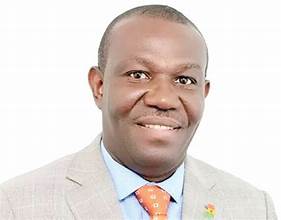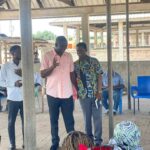Emmanuel Kwasi Bedzrah, MP for Ho West and Member of the ECOWAS Parliament called for practical formulation of policies that aim to address the root causes of instability on the continent in order to promote inclusive governance that will empower all segments of society, and foster sustainable development to benefit present and future generations.
To achieve this ambitious target, the MP said, Parliaments of Member States need to hold the Executive Arm in their respective countries accountable to the people they serve, and in promoting transparency, responsiveness, and meaningful participation in decision-making processes that will make the citizenry to actively engage in conflict resolution efforts, in promoting dialogue, mediation, and reconciliation as alternatives to violence and confrontation.
In a statement on the floor of Ghana’s Parliament, Emmanuel Kwasi Bedzrah urged ECOWAS to “tirelessly and with unwavering determination restore trust among Parliaments to play the watch-dog role, between governments and their citizens; and above all, demonstrate the political will to act decisively, collectively, and with a sense of urgency in the face of these unprecedented challenges”.
He said, “this is not a time for despair. It is a time for leadership. It is a time for moral courage. And it is a time for vision. We, the parliamentarians of ECOWAS, must rise to this occasion not merely as political actors, but as the stewards of the region. Our people look to us not only for laws but for hope. Not only for policies, but for progress. Not only for debates, but for direction”.
Below is the full statement:
ECOWAS At 50: STATEMENT BY HON. EMMANUEL KWASI BEDZRAH, MP FOR HO WEST CONSTITUENCY AND MEMBER OF THE ECOWAS PARLIAMENT
Mr. Speaker, thank you for the opportunity to make this important statement in commemoration of the 50th anniversary of the Economic Community of West African States (ECOWAS), I must say that we are not merely celebrating a milestone; we are compelled to engage in a profound and unflinching reflection on the trajectory of our journey. This is a time for critical introspection, a time to acknowledge not only the considerable achievements that have marked our path but also the complex and multifaceted challenges that now confront us, threatening to derail the very progress we have so diligently pursued.
As we celebrate this golden jubilee, we are reminded of our shared aspirations for peace, development, and prosperity. But we are also confronted with a sobering reality – one that demands not only reflection but urgent and courageous action.
Right Honourable Speaker, the ECOWAS, over the last fifty years, has demonstrated its capacity to shape the course of our sub-region. From boosting regional economic integration to playing a frontline role in peacekeeping and post-conflict reconstruction, the Community has not only survived the political and economic turmoil that has afflicted our continent – it has, at many points, led the way. We remember the successful interventions in Liberia, Sierra Leone, and The Gambia, which stand as testaments to our collective ability to defend democracy and restore constitutional order. We have witnessed significant strides in fostering regional peace and stability, facilitating the free movement of people and goods across our borders, promoting trade liberalization to enhance economic growth, and implementing a diverse array of programs aimed at enhancing the quality of life for our citizens. From infrastructural development to agricultural initiatives, from educational exchanges to cultural collaborations, ECOWAS has played a pivotal role in shaping the destiny of our sub-region.
However, despite these successes over the past five decades, we cannot ignore the significant setbacks that currently threaten to unravel decades of integration and cooperation. West Africa’s regional bloc, the ECOWAS faces disintegration. We are witnessing, perhaps more than ever before, the growing fragmentation of our bloc. Recent years have seen challenges to the stability of the bloc, including political unrest, security threats, and the withdrawal or break away of countries from the bloc. On 28 January 2024, Niger, Mali, and Burkina Faso announced via a joint statement that they were withdrawing from ECOWAS “without delay”, following the military coups, the withdrawal was granted in January 2025 – even though the tide can still be reversed until July 2025.
Today, other countries are express dissatisfaction with our union’s effectiveness and responsiveness. The very notion of a united, peaceful, and integrated West Africa now appears under siege.
Right Hon. Speaker, security challenges, ranging from the escalating menace of terrorism and violent extremism that spill across our porous borders to the scourge of transnational organized crime, including drug and human trafficking, and the persistent threat of maritime piracy that disrupts trade and endangers the lives of our people, pose a direct and immediate threat to the safety and well-being of our citizens. The proliferation of these threats has not only created a pervasive climate of fear and uncertainty, undermining investors’ confidence and hindering economic growth, but has also diverted scarce resources away from critical development priorities such as education, healthcare, and infrastructure, further exacerbating the vulnerabilities of our populations and perpetuating a vicious cycle of poverty and instability.
A significant factor contributing to this is the perceived and, in some cases, the undeniable failure of national and regional parliaments to effectively address these multifaceted challenges. This failure can be attributed to a combination of factors, including capacity limitations that hinder our ability to conduct thorough oversight of the executive branch and formulate sound and evidence-based policies, financial constraints that limit our operational effectiveness, independence, and ability to adequately represent the interests of our constituents, and, most concerningly, a lack of political will, which undermines our ability to take decisive action in the face of difficult choices and to hold those in power accountable for their actions. We, as parliamentarians, must accept our share of responsibility in this regard.
We must acknowledge that we have not always lived up to the expectations of our citizens, and we must commit ourselves to doing better. The erosion of public trust in our institutions, including parliaments, is a serious and deeply concerning issue that must be addressed with the utmost urgency. We must strive to enhance our legitimacy, strengthen our accountability mechanisms, and improve our responsiveness to the needs and aspirations of the people we represent, ensuring that their voices are heard and their concerns are addressed.
We stand at a critical juncture in the history of our region, a moment of profound decision that will determine the future of ECOWAS and the fate of millions of our citizens. The painful lessons of our past should serve as a stark and sobering reminder of the devastating consequences of division, discord, and a failure to address the legitimate grievances of our people. In some member states, there exists a growing perception that ECOWAS is either slow to act or detached from the lived realities of ordinary citizens. Others feel that its mechanisms are skewed in favour of certain political or economic elites, leaving behind nations whose concerns may differ due to geography, security threats, or governance structures.
At the heart of these challenges lies a critical institutional question: what has been the role of national and regional parliaments in either addressing or failing to mitigate these crises? As legislators, our duty extends beyond representation; we are tasked with upholding democratic norms, ensuring government accountability, and safeguarding the rule of law. Yet, in too many instances, national parliaments have been sidelined, weakened, or co-opted by narrow interests. The ECOWAS Parliament itself, although a symbol of regional cooperation, has often lacked the teeth to act decisively in moments of continental turbulence.
The ECOWAS Parliament, and indeed all national parliaments, have a vital and indispensable role to play in ensuring stability, promoting good governance, and fostering sustainable development in our region. Our influence must be brought to bear through a multi-pronged approach that encompasses: strengthening our oversight of the executive branches of our governments, ensuring that they adhere to democratic principles, uphold the rule of law, and respect fundamental human rights.
We must proactively formulate policies that address the root causes of instability, promote inclusive governance that empowers all segments of society, and foster sustainable development that benefits present and future generations. We must hold the Executive Arm accountable to the people they serve, ensuring transparency, responsiveness, and meaningful participation in decision-making processes; actively engaging in conflict resolution efforts, promoting dialogue, mediation, and reconciliation as alternatives to violence and confrontation; tirelessly and with unwavering determination restore trust among member states and between governments and their citizens; and above all, demonstrate the political will to act decisively, collectively, and with a sense of urgency in the face of these unprecedented challenges. This is not a time for despair. It is a time for leadership. It is a time for moral courage. And it is a time for vision. We, the parliamentarians of ECOWAS, must rise to this occasion not merely as political actors, but as the stewards of the region. Our people look to us not only for laws but for hope. Not only for policies, but for progress. Not only for debates, but for direction.
In a recent High-Level Convening held in Abuja, Nigeria, with the theme: ECOWAS at 50 – Reform or Disintegrate: Which Pathway for the Regional Bloc? Among others, the participants rose with a call to reform the ECOWAS Parliament, to play a more legislative role in the community. 50th anniversary should not just be to celebrate our past, but to commit to a future that is more united, more democratic, and more prosperous – and ECOWAS Parliament must play a greater role. Let it be said that in the face of regional fragmentation and rising uncertainty, the ECOWAS Parliament stood firm.
That we found in adversity the resolve to transform our institutions, to deepen our integration, and to reaffirm our faith in a common West African destiny.
As I conclude, I urge the Rt Hon Speaker to use his high office to refer this statement to the Parliamentary Sub-Committee on Foreign Affairs for further deliberation and presentation of the house report to the ECOWAS Commission in commemoration of the ECOWAS at 50 celebrations especially as West Africa seeks to redefine the future of regional integration and resilience. May this moment be our renaissance – not our retreat. Let this golden jubilee be remembered not as a time of decline, but as the beginning of our renewal.
I thank you for your attention.
God bless the ECOWAS Parliament, and may God bless the peoples of West Africa.







